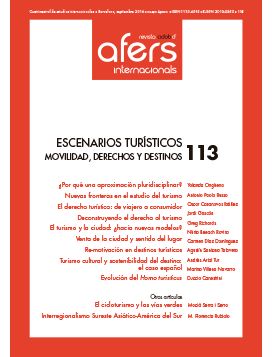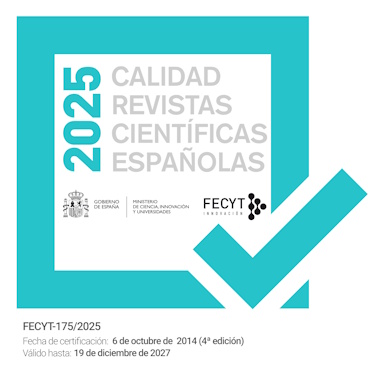Deconstructing the right to tourism
Keywords:
right to tourism, human rights, World Tourism Organization, United Nations, tourist industryAbstract
Revista CIDOB d’Afers Internacionals, nº 113
Quadrimestral (May-September 2016)
ISSN:1133-6595 | E-ISSN:2013-035X
DOI: https://doi.org/10.24241/rcai.2016.113.2.51
Since the 1980s, the World Tourism Organization (UNWTO) has been developing and spreading a discourse that takes tourism to be a right. This paper critically analyses the basis of this idea in order to attempt to scrutinise the aim behind it. The study reaches the conclusion that considering tourism a right helps to legitimise the presence of the UNWTO within the United Nations structure and to defend the interests of tourism capital, to which the organisation has close links.
>> The full text articles of this issue are available only in Spanish language
References
Andrews, Hazel (ed.). Tourism and Violence. Surrey: Ashgate, 2014.
Benjaminsen, Tor A. y Bryceson, Ian. «Conservation, green/blue grabbing and accumulation by dispossession in Tanzania». Journal of Peasant Studies, vol. 39, n.º 2 (2012), p. 335-355.
Bianchi, Raoul y Stephenson, Marcus. «Deciphering tourism and citizenship in a globalized world». Tourism Management, vol. 39 (2013), p. 10-20.
Bianchi, Raoul y Stephenson, Marcus. Tourism and citizenship: Rights, freedoms and responsibilities in the global order. Londres: Routledge, 2014.
Blázquez, Macià; Cañada, Ernest y Murray, Ivan. «Búnker playa-sol. Conflictos derivados de la construcción de enclaves de capital transnacional turístico español en El Caribe y Centroamérica». Scripta Nova: Revista electrónica de geografía y ciencias sociales, vol. 15, n.º 368 (2011) (en línea) [Fecha de consulta: 23.07.2015] http://www.ub.edu/geocrit/sn/sn-368.htm
Bojórquez, Jesús y Villa, Manuel Ángeles. «Expansión turística y acumulación por desposesión: el caso de Cabo San Lucas, Baja California Sur (México)». Cuadernos de Geografía - Revista Colombiana de Geografía, vol. 23, n.º 2 (2014), p. 179-202.
Breakey, Noreen y Breakey, Hugh. «Is there a right to tourism?». Tourism Analysis, vol. 18, n.º 6 (2013), p. 739-748.
Buades, Joan. «Copenhague y después: El turismo y la justicia climática global». Opiniones en Desarrollo, n.º 4 (2009) (en línea) [Fecha de consulta: 23.07.2015] http://www.albasud.org/publ/docs/23.pdf
Cañada, Ernest (coord.). Turismos en Centroamérica: Un diagnóstico para el debate. Managua: Enlace, 2013.
Castañeda, Quetzil. «The neoliberal imperative of tourism: Rights and legitimization in the UNWTO Code of Ethics for Tourism». Practicing Anthropology, vol. 34, n.º 3 (2012), p. 47-51.
Cheong, So-Min y Miller, Marc L. «Power and tourism: A Foucauldian observation». Annals of Tourism Research, vol. 27, n.º 2 (2000), p. 371-390.
D’Sa, Eddie. «Wanted: tourists with a social conscience». International Journal of Contemporary Hospitality Management, vol. 11, n.º 2/3 (1999), p. 64-68.
Duterme, Bernard. «Expansion du tourisme international: gegnants et perdants». Alternatives Sud, vol. 13, n.º 3 (2006), p. 7-22.
Gascón, Jordi. «Introducción: Apuntes para un análisis crítico del turismo», en: Buades, Joan; Cañada, Ernest y Gascón, Jordi. El turismo en el inicio del milenio: Una lectura crítica a tres voces. Madrid: Foro de Turismo Responsable, 2012, p. 11-21.
Gascón, Jordi y Ojeda, Diana. Turistas y campesinado: el turismo como vector de cambio de las economías campesinas en la era de la globalización. Madrid y Tenerife: Pasos, Foro de Turismo Responsable, 2014.
Hall, Michael C. «Editorial: Por-Poor Tourism: Do Tourism Exchanges Benefit Primaly the Countires of the South?», en: Hall, C. Michael (ed.). Pro-poor tourism: Who benefits?: Perspectives on tourism and poverty reduction. Bristol: Channel View Publications, 2007, p. 1-8.
Hall, Michael C. El turismo como ciencia social de la movilidad. Madrid: Síntesis, 2009, p. 422.
Hannam, Kevin. «Tourism and development. I: Globalization and power». Progress in Development Studies, vol. 2, n.º 3 (2002), p. 227-234.
Harvey, David. The New Imperialism. Londres: Oxford University Press, 2003.
Harvey, David. 17 contradicciones y el fin del capitalismo. Quito: IAEN, 2014.
Hazel, Neal. «Holidays for children and families in need: An exploration of the research and policy context for social tourism in the UK». Children & Society, vol. 19, n.º 3 (2005), p. 225-236.
Heyns, Christof H. y Viljoen, Frans (eds.). The impact of the United Nations human rights treaties on the domestic level. Boston: Martinus Nijhoff Publishers, 2002.
Higgins-Desbiolles, Freya. «More than an “industry”: The forgotten power of tourism as a social force». Tourism Management, vol. 27, n.º 6 (2006), p. 1.192-1.208.
Higgins-Desbiolles, Freya. «Resisting the hegemony of the market: Reclaiming the social capacities of tourism», en: McCabe, Scott; Minnaert, Lynn y Diekmann, Anya (eds.). Social tourism in Europe: Theory and practice. Bristol: Channel View Publications, 2011, p. 53-68.
Higgins-Desbiolles, Freya y Russell-Mundine, Gabrielle. «Absences in the volunteer tourism phenomenon: The right to travel, solidarity tours and transformation beyond the one-way», en: Lyons, Kevin D. y Wearing, Stephen (eds.). Journeys of discovery in volunteer tourism: international case study perspectives. Oxfordshire: CABI, 2008, p. 182-194.
Higgins-Desbiolles, Freya y Whyte, Kyle Powys. «Tourism and human rights», en: Hall, C. Michael; Gössling, Stefan y Scott, Daniel (eds.). The Routledge Handbook of Tourism and Sustainability. Oxon: Routledge, 2015, p. 105-116.
Hospitalitynet. «UNWTO And International Business Leaders Forum Announce A New Human Rights Initiative For The Tourism Industry» (2006) (en línea) [Fecha de consulta: 23.07.2015] http://www.hospitalitynet.org/news/4026791.html
ICTE-Instituto para la Calidad Turística Española. «Miembros» (s.f.) (en línea) [Fecha de consulta: 23.07.2015] http://www.icte.es/ESP/e/13/El-ICTE/Miembros
Jessup, Philip Caryl. A modern law of nations: An introduction. Hamden, CT: Archon Books, 1968.
Kingsbury, Paul. «Jamaican tourism and the politics of enjoyment». Geoforum, vol. 36, n.º 1 (2005), p. 113-132.
Mangalassery, Sumesh. «Regulator or Facilitator?: Redefining the Role of Governments», en: Kamp, Christina (ed.). Beyond Greening: Reflections on Tourism in the Rio-Process. Bonn: EED, 2012, p. 57-62.
McCabe, Scott y Diekmann, Anya. «The rights to tourism: reflections on social tourism and human rights». Tourism Recreation Research, vol. 40, n.º 2 (2015), p. 194-204.
Ministerio de Turismo-Ecuador. «Sudamérica propone que el turismo sea considerado un derecho humano» (2013) (en línea) [Fecha de consulta: 28.03.2016] http://www.turismo.gob.ec/sudamerica-propone-que-el-turismosea-considerado-un-derecho-humano/
Minnaert, Lynn; Maitland, Robert y Miller, Graham. «What is social tourism?». Current Issues in Tourism, vol. 14, n.º 5 (2011), p. 403-415.
Nowicka, Pamela. Vacaciones en el paraíso: turismo y desarrollo. Barcelona: Intermon OXFAM, 2008.
OIT-Organización Internacional del Trabajo. «Cambios y desafíos en el sector de la hotelería y el turismo». Documento temático para el debate en el Foro de diálogo mundial para el sector de la hotelería, la restauración y el turismo. Informe GDFHTS/2010 (2010). Ginebra (en línea) [Fecha de consulta: 23.07.2015] http://www.ilo.org/wcmsp5/groups/public/---ed_dialogue/---sector/documents/meetingdocument/wcms_162207.pdf
OIT-Organización Internacional del Trabajo. «Hotelería, restauración, turismo» (s.f.) (en línea) [Fecha de consulta 23.07.2015] http://www.ilo.org/global/industries-and-sectors/hotels-catering-tourism/lang--es/index.htm
OMT-Organización Mundial del Turismo. «Declaración de Manila sobre el Turismo Mundial» (1980) (en línea) [Fecha de consulta: 01.04.2016] http://www.e-unwto.org/doi/pdf/10.18111/unwtodeclarations.1980.6.6.1
OMT-Organización Mundial del Turismo. «Carta del turismo y código del turista» (1985) (en línea) [Fecha de consulta: 23.07.2015] http://www.apiepr.org/files/carta-codigo-turista.pdf
OMT-Organización Mundial del Turismo. «Declaración El turismo al servicio de los objetivos de desarrollo del Milenio» (2005) (en línea) [Fecha de consulta: 7.4.2016] http://cf.cdn.unwto.org/sites/all/files/docpdf/declaracionny-esp.pdf
OMT-Organización Mundial del Turismo. Documentos básicos de la OMT. Volumen I. Cuarta edición, actualizada y revisada. Madrid: OMT, 2013.
OMT-Organización Mundial del Turismo. «Acerca de la OMT» (s.f.[a]) (en línea) [Fecha de consulta: 05.04.2016] http://www2.unwto.org/es/content/acerca-de-la-omt
OMT-Organización Mundial del Turismo. «¿Por qué el Turismo?» (s.f.[b]) (en línea) [Fecha de consulta: 23.07.2015] http://www2.unwto.org/es/content/por-que-el-turismo
OMT-Organización Mundial del Turismo. «Código Ético Mundial para el Turismo» (s.f.[c]) (en línea) [Fecha de consulta: 23.7.2015] http://cf.cdn.unwto.org/sites/all/files/docpdf/gcetbrochureglobalcodees.pdf
OMT-Organización Mundial del Turismo y OIT-Organización Internacional del Trabajo. «Acuerdo entre la Organización Mundial del Turismo (OMT) y la Organización Internacional del Trabajo (OIT)» (2008) (en línea) [Fecha de consulta: 23.07.2015] http://www.ilo.org/wcmsp5/groups/public/---ed_norm/---relconf/documents/meetingdocument/wcms_090605.pdf
Pleumaron, Anita. «Tourisme, mondialisation, consumérisme et développement durable en Asie du Sud-Est». Alternatives Sud, vol. 13, n.º 3 (2006), p. 133-148.
Presidencia de la República Oriental de Uruguay. «Nueva ley crea Consejo Nacional de Turismo y fondo para el fomento de la actividad». Comunicado de prensa (21 de agosto de 2014) (en línea) [Fecha de consulta: 23.07.2015] http://presidencia.gub.uy/comunicacion/comunicacionnoticias/nueva-leycrea-consejo-nacional-de-turismo-y-fondo-para-el-fomento-de-la-actividad
República Oriental del Uruguay-Poder Legislativo. «Ley n.º 19.253 sobre actividad turística» (28 de agosto de 2014) (en línea) [Fecha de consulta: 23.07.2015] http://faolex.fao.org/docs/pdf/uru138821.pdf
Rifari, Taleb. «Foreword», en: Buhalis, Dimitrios y Darcy, Simon (eds.). Accessible tourism: Concepts and issues. Bristol: Channel View Publications, 2011, p. xx.
Schilcher, Daniela. «Growth versus Equity: The Continuum Of Pro-Poor Tourism and Neoliberal Govenance», en: Hall, C. Michael (ed.). Pro-poor tourism: Who benefits?: Perspectives on tourism and poverty reduction. Bristol: Channel View Publications, 2007, p. 56-83.
Scott, Daniel; Peeters, Paul y Gössling, Stefan. «Can tourism deliver its “aspirational” greenhouse gas emission reduction targets?». Journal of Sustainable Tourism, vol. 18, n.º 3 (2010), p. 393-408.
Simpson, Brian y Simpson, Cheryl. «The End of Tourism, the Beginning of Law?», en: Burns, Peter y Novelli, Marina (eds.). Tourism and politics: Global frameworks and local realities. Oxford: Elsevier, 2007, p. 369-388.
Simpson, Brian y Simpson, Cheryl. From heritage to terrorism: regulating tourism in an age of uncertainty. Londres: Routledge, 2010.
UNWTO-World Tourism Organization. «Climate Change and Tourism: Responding to Global Challenges. Madrid: World Tourism Organization» (2008) (en línea) [Fecha de consulta: 23.07.2015] http://sdt.unwto.org/sites/all/files/docpdf/climate2008.pdf
UNWTO-World Tourism Organization. «From Davos to Copenhagen and Beyond: Advancing Tourism’s Response to Climate Change: UNWTO Background Paper» (2009) (en línea) [Fecha de consulta: 23.07.2015] http://sdt.unwto.org/sites/all/files/docpdf/fromdavostocopenhagenbeyondunwtopaperelectronicversion.pdf
UNWTO-World Tourism Organization. «Sustainable Tourism for Development» (2013) (en línea) [Fecha de consulta: 23.07.2015] http://cf.cdn.unwto.org/sites/all/files/docpdf/devcoengfinal.pdf
UNWTO-World Tourism Organization. «Committees» (s.f.[a]) (en línea) [Fecha de consulta: 23.07.2015] http://www2.unwto.org/en/node/17
UNWTO-World Tourism Organization. «UNWTO Affiliate MembersDirectory» (s.f.[b]) (en línea) [Fecha de consulta: 07.06.2015] http://affiliatemembers.unwto.org/es/affiliate-members-directory
UNWTO-World Tourism Organization e ILO-International Labour Organization. «ILO/UNWTO Statement on Tourism and Employment» (2009) (en línea) [Fecha de consulta: 23.07.2015] http://www.ilo.org/wcmsp5/groups/public/---ed_dialogue/---actor/documents/statement/wcms_162290.pdf
UNWTO-World Tourism Organization e ILO-International Labour Organization. Measuring Employment in the Tourism Industries: Guide with Best Practices. Madrid y Ginebra: UNWTO-ILO, 2014.













